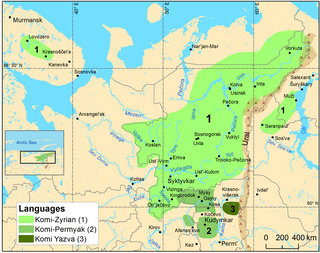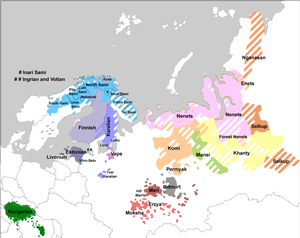Komi-Yazva language
This article needs additional citations for verification. (April 2010) |
| Komi-Yodz | |
|---|---|
| Коми-Ёдз көл | |
| Native to | Russia |
| Region | Perm Krai |
| Ethnicity | 4000 Yazva Komi |
Native speakers | 200 (2007)[1] |
| Language codes | |
| ISO 639-3 | – |
| Glottolog | komi1277 |
| ELP | Yazva |
 Traditional distribution of the Komi languages | |
 Yazva Komi is classified as Severely Endangered by the UNESCO Atlas of the World's Languages in Danger (2010) | |
The Komi-Yazva language (Коми-Ёдз көл, Komi-Jodz kål) is a Permic language closely related to Komi-Zyrian and Permyak, and spoken mostly in Krasnovishersky District of Perm Krai in Russia, in the basin of the Yazva (Yodz) River. It has no official status. It is the most divergent of all the Komi varieties.[2] About two thousand speakers densely live in Krasnovishersky District.

Studies
[edit]Availability[clarification needed] of the particular vowels together with features of phonetics and stress system led Finnish linguist Arvid Genetz in 1889 to consider Komi-Jazva as a separate dialect.[citation needed] Later, this decision was confirmed by the famous Finno-Ugricist Vasily Lytkin, who studied the Komi-Jazva idiom in depth from 1949 until 1953.[citation needed]
Linguogeography
[edit]Area and number
[edit]In the early 1960s, about 2,000 speakers lived compactly on the territory of Krasnovishersky District of Perm Krai (Antipinskaya, Parshakovskaya, Bychinskaya and Verkh-Yazvinskaya village administrations). In total, there were about 3,000 language-speakers.[3]
Status
[edit]The presence of special vowel sounds, specific phonetics and accent system allowed first Finnish linguist Arvid Genetz, who studied the people in 1889, and then the Finno-Ugric philologist Vasily Lytkin, who visited the Komi-Yazvinians three times between 1949 and 1953, to identify the Komi-Yazvinians as a separate dialect.[3] Some researchers consider it to be a dialect of the Komi-Permyak language.[4]
Alphabet
[edit]The first Komi-Yazva primer was printed in 2003. Its author was the teacher of the Parshavskaya school A. L. Parshakova. This book also became the first one ever printed in Komi-Yazva language.
| А а | Б б | В в | Г г | Д д | Е е | Ё ё | Ж ж |
| З з | И и | Й й | К к | Л л | М м | Н н | О о |
| Ө ө | Ӧ ӧ | П п | Р р | С с | Т т | У у | Ӱ ӱ |
| Ф ф | Х х | Ц ц | Ч ч | Ш ш | Щ щ | Ъ ъ | Ы ы |
| Ь ь | Э э | Ю ю | Я я |
See also
[edit]References
[edit]- ^ Moseley, Christopher, ed. (2007). Encyclopedia of the world's endangered languages. London: Routledge. ISBN 978-0-415-56331-4. OCLC 47983733.
- ^ Comrie, Bernard (1981). The languages of the Soviet Union. Cambridge language surveys. Cambridge [Eng.] ; New York: Cambridge University Press. ISBN 978-0-521-29877-3.
- ^ a b Vasily Lytkin (1961). The Komi-Yazvin dialect. Academy of Sciences of the USSR Publishing House.
- ^ I︠A︡zyki mira. Uralʹskie i︠a︡zyki. V. N. I︠A︡rt︠s︡eva, I︠U︡. S. Eliseev, K. E. Maĭtinskai︠a︡, O. I. Romanova, Institut i︠a︡zykoznanii︠a︡. Moskva: Nauka. 1993. ISBN 5-02-011069-8. OCLC 28635260.
{{cite book}}: CS1 maint: others (link)
Bibliography
[edit]- Hausenberg, Annu-Reet (1998). "Komi". In Abondolo, Daniel (ed.). The Uralic languages. Routledge. pp. 305–326. ISBN 0-415-08198-X.
- Лыткин В. И., Тепляшина Т. И. Пермские языки // Основы финно-угорского языкознания / ИЯ АН СССР. — Т.3. — М.: Наука, 1976.
- = Lytkin, V. I.; Teplyashina, T. I. "Permic languages". The Fundamentals of Fenno-Ugric linguistics. (The Academy of Sciences of the USSR.) Vol. 3. Moscow: Nauka, 1976.
- Лыткин В. И. Коми-язьвинский диалект. — М.: Издательсвто АН СССР, 1961.
- = Lytkin, V. I. (ed.) The Komi-Yazva dialect. Moscow, 1961.
- Коми-пермяцкий язык / Под ред. проф. В. И. Лыткина. — Кудымкар: Коми-пермяцкое книжное издательство, 1962.
- = Lytkin, V. I. (ed.) The Komi-Permyak language. Kudymkar, 1962.
- Паршакова А. Л. Коми-язьвинский букварь. Пермь, 2003.
- = Parshakova, A. L. Komi-Yazva primer. Perm, 2003.

